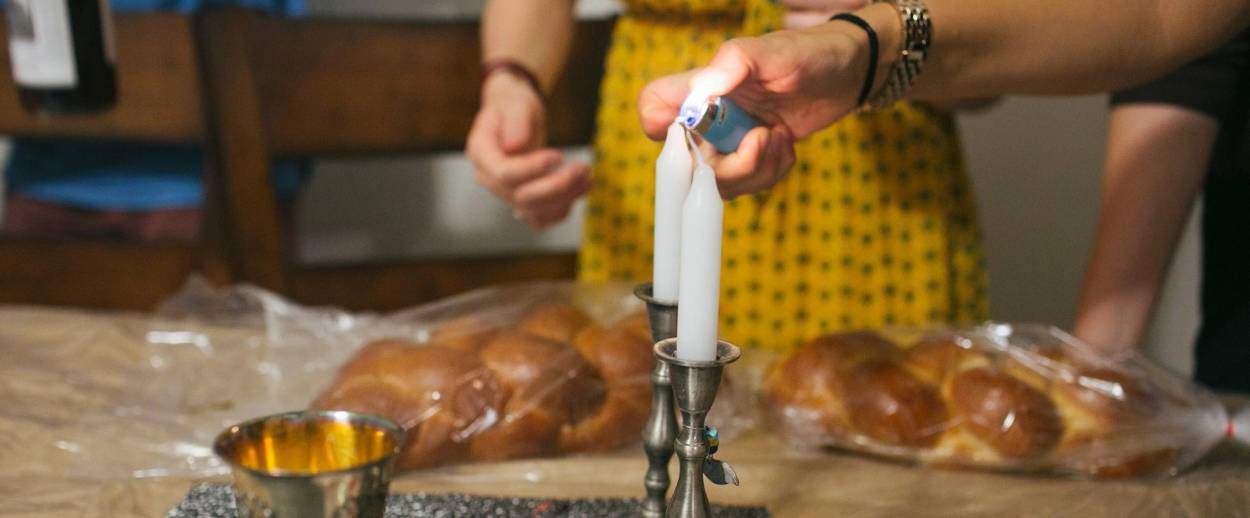Why Do So Many Israelis Only Connect With Judaism When They Come to America?
Making sense of a strange phenomenon




Early in 2005, while serving as a shaliach, an Israeli educator, in a Jewish school in southern Florida, I started noticing a curious phenomenon. It was brought to my attention by the school’s security guard, a fellow Israeli: Back home, he told me, he wasn’t much of an observant Jew, having rarely visited a shul since his bar mitzvah. But as soon as he came to the United States, he confessed to me, he started to realize how important Judaism truly was to him, which led him to lay tefillin every morning. I asked him how he explained this change, and he said that he felt Israel was overrun by kfiya datit, Hebrew for religious coercion, a term secular Israelis use often to complain about too much religion in the public sphere. Under these circumstances, he said, it was hard for him to connect to being Jewish; America was a very different story.
At the time, I thought my colleague’s story was an exception. But having reported on Israel-diaspora relations for a leading Israeli publication for years now, I know it to be the rule: Hundreds of thousands of Israelis, emigrating to the United States or elsewhere, are suddenly discovering their roots and coming out as Jews, lighting Shabbat candles, sending their kids to a Jewish school, and attending services every week.
To be frank, I find this phenomenon annoying.
As an American-born Jew who had made aliyah, it’s hard for me to come to terms with the realization that the Jewish state is failing so miserably at being the one place in the world where Jews can go to freely practice their faith.
What accounts for this failure? I don’t agree that the fault lies squarely with Orthodoxy, as my friend in Florida had once suggested. Sure, Israel has no separation of church and state, and having an official state-sponsored body meddle in intimate affairs like weddings and burials is far from ideal. But the problem is deeper, as I learned a few years back while attending a delegation designed to familiarize Israeli journalists with American Jewish life.
One of my fellow delegates, a senior Israeli TV anchorwoman, stood up and said she felt outraged that she was not able to become acquainted with other streams of Judaism while living in Israel. “All these years,” she said emotionally, “I thought that if I wanted to be plugged in to Jewish life, I had to be Orthodox. Now I understand that there’s a great wealth of ways to worship out there, including diverse denominations that I feel much better represent me.” I waited for her to finish, and then, politely, told her that Israel, too, was blessed with Reform, Conservative, and Reconstructionist denominations galore; it’s just that my colleague, intelligent and well informed as she is, had never heard of them. Why? That, as they say, is the $64,000 question.
Put simply, the question is this: How can it be that a young Israeli can undergo years of education in a state-run school, attend an Israeli youth movement and consume Israeli culture, and still not emerge feeling thoroughly rooted in Jewish peoplehood or the Jewish faith? Or, more bluntly, how can it be that so many of us hear basic prayers for the first time only when attending, say, a Reform summer camp in America, an experience that drives many more still to grow more observant?
It’s a complicated conundrum to resolve, but one to which American Jewish organizations, thankfully, are growing more and more attuned. Take, for example, the Israeli-American Council, the umbrella organization for all Israelis living stateside. At first, the group held its meetings on the weekends, as it seemed inconceivable to them that any observant people might attend. These days, the official conferences start Saturday evening with a havdalah prayer recited by a cantor. Conferences also include sessions devoted to studying Jewish texts, reflecting the realization that as cool as it may be to gather around once a year and listen to some popular Israeli singer, Israeli culture alone is not going to serve as a bulwark against assimilation. To survive as Jews, Israelis now understand, they’ve no choice but to connect back to the real source—Judaism.
As annoyed as I am by the thought that the Jewish state itself is failing so clearly to serve as the global engine powering Jewish life, I am also greatly optimistic. As more and more programs bring Israelis to the States, more and more of us return with a growing understanding of how rich and rewarding American Jewish life truly is. The average Israeli would love nothing more than to send her children to a Jewish school as thoughtful and accomplished as some of the more thriving American day schools, or to a summer camp, like Ramah, so dedicated not only to fun but also to meaning and values.
It’s time, then, for us Israelis to reverse the age-old paradigm that our relationship with our American Jewish cousins is a one-way street. We ought to look at the way our fellow Israelis grow more Jewish when abroad, and benefit from the American Jewish experience as we seek to make Israel, too, a place where you can be Jewish comfortably and joyously.
***
Like this article? Sign up for our Daily Digest to get Tablet magazine’s new content in your inbox each morning.
Zvika Klein is an award-winning journalist who lives in Jerusalem and works for Makor Rishon daily national newspaper covering Jewish Diaspora Affairs.